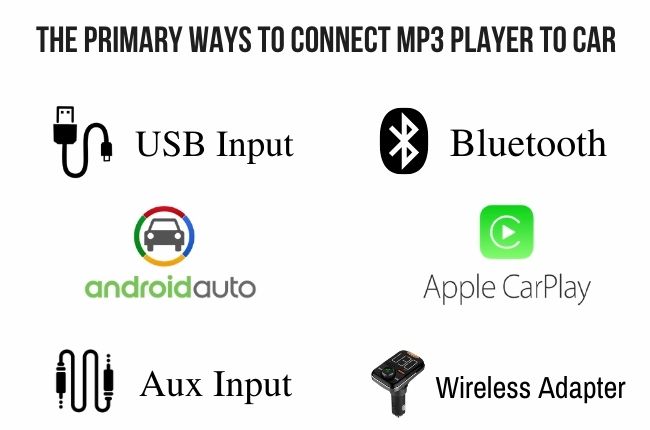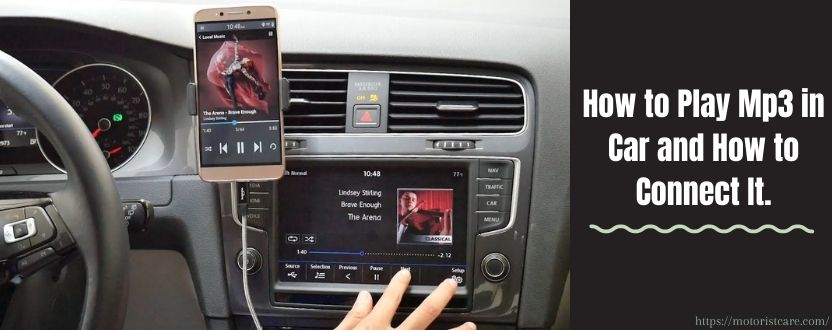Remember MP3 players? Those were the days, weren’t they? Imagine going on a long road trip with your mates. You gather stories to tell and memories of a lifetime all while listening to your favorite music.
Whether you want to show off your hip song collection to your mates or just put some soothing tunes during a journey for yourself, here is a complete guide on how to play mp3 in car.
Most people now listen to music on their smartphones. Dedicated devices for listening to music like MP3 players are still high in popularity though.
Plus, given some hard to ignore benefits of using your MP3 to listen to songs in your car, you can’t afford to miss out on knowing these simple and easy tricks. So, without further to do, let’s get started.
How to Play MP3 In Your Car
There are actually a couple of ways you can do this. Let’s address each of them so you can pick from which one suits your needs (and your car stereo) the best.
Before we get started though, remember the options you’ll have for connecting an MP3 player depends on your head unit.
Then there is also the compatibility concerns of the said head unit with your device. That being said, here are the primary ways you can connect the player to your car if you want to jam out to some tunes while on the road.

1. USB
This is perhaps the easiest and one of the most common ways you can connect your device/MP3. Depending on the type of head unit you have, you’ll see USB ports that act just like the USB ports of your computer – to some extent.
If your MP3 has a USB port as well, then you can just use that to connect to your car and play the music that way. It’s easy and convenient, and chances are you have been connecting your player via USB anyway when you’re at home.
Your player needs to support USB input though and so does your car. That’s something you’ll need to ensure.
2. Bluetooth
We long for the day where everything will be wireless. We’re quite serious. Wireless is just convenient and much easy to deal with day-to-day. That’s why, if you have Bluetooth support, you can’t go wrong with a good old wireless connection via Bluetooth.
Bluetooth connections have gotten much better over the past couple of years, and nowadays, they give you a solid connection almost akin to a wired connection. You can not only use your MP3 to connect this way but also your phone.
If you don’t have an aux port, you might be asking yourself how to connect an MP3 player to car stereo without AUX. And, honestly, Bluetooth is the answer. There are other alternatives, but you can’t beat the convenience of not having to deal with wires.
Read Also: How to connect Bluetooth to JVC car stereo
3. AUX
Let’s talk about that AUX connection now then, shall we? Head units and devices that have an AUX port, are actually one of the easier ways to connect your device.
There will be a 3.5mm standard headphone jack which you can use to easily connect and play music for your players. Get a male-to-male 3.5mm cable and you should be all set.
4. Wireless Adapter (FM Transmitter)
Another wireless option you can use for connecting your MP3 to the car is through a wireless adapter. The great thing about these adapters, or FM transmitters as they’re sometimes called is, they will work with almost any car stereos.
Whether you have a factory stock car stereo or an aftermarket one, you should be able to find a wireless adapter that will work for less than $50 or so. The signal from your player can be transmitted to the car’s stereo system in a frequency that’s not in use by other nearby radios.
Simply get an adapter and connect it to the audio jack (3.5mm jack) on your MP3 player. The adapter will transmit the frequencies to a form of FM radio which your car can understand and can pick up on.
Some adapters can even charge your device at the same time as well. So, that’s a win-win.
5. Apple CarPlay or Android Auto
If you’re using an iPod or have an Android-powered modern MP3 player then enter Apple CarPlay or Android Auto. Some newer head units will come with native built-in support for Apple CarPlay and Android Auto.
If your device/MP3 player also supports the technology, playing MP3 through car radio is as easy as pie. They will easily connect using wireless technology and will also give you a pretty cool interface to work with as well. These are all quite nifty features.
Read More: Apple Carplay Vs Android Auto Comparison
Why Would You Want to Connect MP3 To Your Car?
You might be wondering; in the age of smartphones why would you even want to connect an MP3 player to your car. If you have a smartphone (and let’s be honest, who doesn’t have a smartphone nowadays) wouldn’t it be much easier to use your phone instead?
Well, there are a couple of reasons why you would listen to music by connecting MP3 to car stereo.
Reason 1: Having a dedicated device is easier
Smartphones are great as they are. They can be used for all sorts of things like navigation and of course playing music in your car. But having a dedicated device is better.
It does one thing and it does it well. Your music isn’t getting disturbed by anything else. That’s a clean benefit.
Reason 2: MP3 players will hold a lot of music
Unless you solely use music streaming apps to listen to music, having an MP3 player to store all your songs will also save you some storage space on your phone.
Besides, if you’re planning for a long road trip, where the cell connection might not be the best, music streaming can get frustrating. Having all your favorite music right on your device is simply the best option in that case.
Reason 3: Less fumbling
Connecting your smartphone and then disconnecting it when you get out of the car can be cumbersome if you have to do it over and over again. Whereas if you just have a single MP3 player connected to your car, that’s much easier.
You need to fumble less. As soon as you’re in the car you’re ready to jam. We don’t know about you guys, but that’s a level of convenience that we love around here especially if the connection is wireless.
Things to Know When Connecting an MP3 to a Car Stereo
Before you go on connecting your MP3 player, there are a couple of things you should know. This will help you choose the better option for your specific needs.
You Get a Better Connection with a Wired USB
Wired connection is more stable and gives you more reliability. Connecting via USB should be easy for almost all cars nowadays if you have a fairly modern head unit.
The sound quality is better as well and it isn’t much of a hassle either. However, USB connections aren’t the most universal in the compatibility department. For older vehicles, you might need to buy extra accessories or adapters.
Can’t Beat AUX for Older Cars
When it comes to universal compatibility, you can’t beat AUX connections. A lot of older car stereos and MP3 players don’t even come with a USB port. But almost all will have an AUX port.
AUX ports are your best bet if you have an older system. They’re reliable and are tried and tested. It’s easy to connect and although the sound might not be as solid as a USB connection, it’s still comparable.
Just make sure you get a 3.5mm male-to-male cable as we mentioned before.
Apple CarPlay/Android Auto/Bluetooth are Great for a Wireless Connection
If you don’t want to deal with wires, going the Bluetooth route is one of your safest bets. Some head units will give you the same functionality as a USB connection with a Bluetooth connection. On top of that, you don’t have to deal with a wired mess either.
It’s super convenient and just works (except when it doesn’t that is). But you can’t beat simple physics, and sound quality is still better with a wired USB connection.
A lot of head units (and compatible devices) can be connected with Apple CarPlay and Android Auto for some serious functionality. However, these aren’t as widely available, especially on older cars.
But if you have the option, you won’t regret connecting an iPod to your car with Apple CarPlay, for example. The functionalities will be much higher and the interface is cool too.
Final Words
Now that you know how to play MP3 in car and what options are best in which scenarios, you shouldn’t have any problem listening to your music when on the road.
Make sure to pick one that works for you and is compatible with your head unit, and you should be all set to go.
Related Posts:

